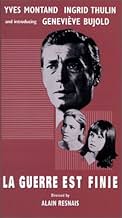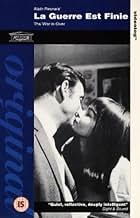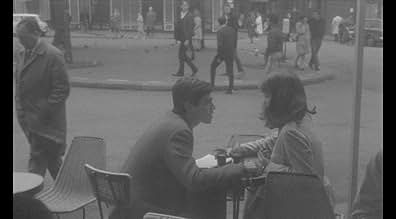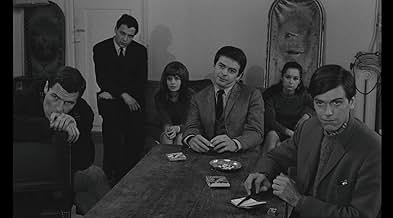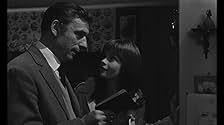VALUTAZIONE IMDb
7,2/10
2581
LA TUA VALUTAZIONE
Aggiungi una trama nella tua linguaA veteran Republican fighter's ardent dedication to overthrow of Franco's regime is challenged. He realizes that the center of political struggle has shifted away from him, and is forced to ... Leggi tuttoA veteran Republican fighter's ardent dedication to overthrow of Franco's regime is challenged. He realizes that the center of political struggle has shifted away from him, and is forced to make choices about his life and political ideals.A veteran Republican fighter's ardent dedication to overthrow of Franco's regime is challenged. He realizes that the center of political struggle has shifted away from him, and is forced to make choices about his life and political ideals.
- Regia
- Sceneggiatura
- Star
- Candidato a 1 Oscar
- 4 vittorie e 4 candidature totali
Recensioni in evidenza
Alain Resnais was almost a god of cinema in the 60's. That people actually discussed the meaning of Last Year at Marienbad at parties seems unbelievable today (yet check the posts for Mulholland Drive), but it was a cultural object just as real as a Picasso painting. If I say that La Guerre est finie has aged badly, that's not to say that it didn't hold the attention of liberals 40 years ago.
The politics of the main (male) characters are fossilized. The old Bolshevik ideals have become more and more detached from reality. Diego knows that there will be no general strike in Spain on May 1st, no matter how hard they will it to happen. Pamphlets smuggled by car into the country in false compartments are not being translated into actions. Diego's lack of authenticity is his real problem: he's spent most of his life in France, speaks better French than Spanish, and is watching people 20 years younger than himself taking more radical steps to end Franco's rule.
Marianne has a greater grasp of reality than her lover. After nine years with Diego, she just wants to settle down and have kids, and put an end to the endless coded conversations with her friends (who are ignorant of Diego's revolutionary activities). She watches as Diego gets sloppy--driving with lights out while there's a suitcase full of plastic explosives in the car, as a cop stops them for questioning.
Semprun's script makes Montand into a sexual magnet; has any 20-year-old girl taken off her clothes faster for a tired 45-year-old man? The star system dictates that the male lead be a stud, but there are limits.
The politics of the main (male) characters are fossilized. The old Bolshevik ideals have become more and more detached from reality. Diego knows that there will be no general strike in Spain on May 1st, no matter how hard they will it to happen. Pamphlets smuggled by car into the country in false compartments are not being translated into actions. Diego's lack of authenticity is his real problem: he's spent most of his life in France, speaks better French than Spanish, and is watching people 20 years younger than himself taking more radical steps to end Franco's rule.
Marianne has a greater grasp of reality than her lover. After nine years with Diego, she just wants to settle down and have kids, and put an end to the endless coded conversations with her friends (who are ignorant of Diego's revolutionary activities). She watches as Diego gets sloppy--driving with lights out while there's a suitcase full of plastic explosives in the car, as a cop stops them for questioning.
Semprun's script makes Montand into a sexual magnet; has any 20-year-old girl taken off her clothes faster for a tired 45-year-old man? The star system dictates that the male lead be a stud, but there are limits.
This film has aged rather well considering that it's nearly 40 years old, that the concrete political situation(the Franco dictatorship in Spain)it was enmeshed in has disappeared, and that the musical score, the very mannered montage, and the sex scenes are all hopelessly dated and stilted. What gives this film its vitality is the screenplay written by Jorge Semprun, and it resonates today as well as it did in the mid-60s. Semprun had just written his classic, "The Long Voyage", in 1963, and the crisp trenchancy of his narrative style is just as evident in this film as it was in that story of his 1944 voyage to Buchenwald as a captured fighter of the French Resistance. Though we may not feel any longer the need to reassess the strategy of how to overthrow Franco, we still know what it's like to feel you're at the end of the rope with no place to leap to (both politically and psychologically). What Semprun reminds us, both in this film and in "The Long Voyage," is that it's the opportunities to experience solidarity with and support for others over the course of the journey that matters in the end.
Resnais really impressed me with this film. He uses real locations and finds subtle atmospheric things that almost never turn up in movies. One sees the way a shadow of a tree moves gently back and forth on the wall as two people relax in bed, the way a gust of wind briefly animates a woman's hair in a subway tunnel.
The movie successfully combines an account of resistance to Franco's Spain from an ex-patriot living in Paris (played by Montand), and his life outside of politics. We see not only his political views, but also how he feels about love and his own situation. Beautiful, brave and innovative, this movie also has some of the most passionate, yet restrained and overall fascinating love scenes that I have seen since Peter Sellers and Shirley Maclaine in 'Being There.'
The movie successfully combines an account of resistance to Franco's Spain from an ex-patriot living in Paris (played by Montand), and his life outside of politics. We see not only his political views, but also how he feels about love and his own situation. Beautiful, brave and innovative, this movie also has some of the most passionate, yet restrained and overall fascinating love scenes that I have seen since Peter Sellers and Shirley Maclaine in 'Being There.'
"Patience and irony are the chief virtues of a Bolshevik."
Beautifully shot, with splashes of visual flair, like the fast edits or the scenes with the exquisite shimmering of light on the ceiling, an echo of the haze of looking back on a life of an underground struggle against fascism in Spain following the Civil War. The film highlights the need for perseverance, brotherhood, and sacrifice over the long haul to achieve regime change, as well as the melancholy that comes from perceiving that at some point one's own personal "war" may be over, but the movement will continue on in younger hands.
I loved the idea of it, but unfortunately, the story is about as dry as toast, and it takes far too long to get to the most interesting bit, which was the old guard revolutionary (Yves Montand) confronted with newer radicals who disagree with him on tactics. I wish that part had been more developed. There is just too much time spent on mundane aspects beforehand, the details for which were rather muddled, to sustain a two hour film. Even the presence of Geneviève Bujold and Ingrid Thulin couldn't save it from being a dull affair, and how Resnais shot the love scene between Bujold and Montand in such a (nearly comical) artsy way didn't help matters. As an exercise in filmmaking and with these stars, it holds some level of interest, but it's hard to see how anyone could get excited over it. Seeing it once was enough.
Beautifully shot, with splashes of visual flair, like the fast edits or the scenes with the exquisite shimmering of light on the ceiling, an echo of the haze of looking back on a life of an underground struggle against fascism in Spain following the Civil War. The film highlights the need for perseverance, brotherhood, and sacrifice over the long haul to achieve regime change, as well as the melancholy that comes from perceiving that at some point one's own personal "war" may be over, but the movement will continue on in younger hands.
I loved the idea of it, but unfortunately, the story is about as dry as toast, and it takes far too long to get to the most interesting bit, which was the old guard revolutionary (Yves Montand) confronted with newer radicals who disagree with him on tactics. I wish that part had been more developed. There is just too much time spent on mundane aspects beforehand, the details for which were rather muddled, to sustain a two hour film. Even the presence of Geneviève Bujold and Ingrid Thulin couldn't save it from being a dull affair, and how Resnais shot the love scene between Bujold and Montand in such a (nearly comical) artsy way didn't help matters. As an exercise in filmmaking and with these stars, it holds some level of interest, but it's hard to see how anyone could get excited over it. Seeing it once was enough.
"La Guerre est Finie" aka The War is Over (1966) from French master Alain Resnais, is a taut intellectual yet very much visual thriller. Yves Montand is in his mature prime, and Ingrid Thulin so quietly sensual, while Geneviève Bujold gave an impressive debut performance. Resnais' creative cinematic approach in rich visual play mixed with voice-over narration, aptly intensified the suspense. We're literally inside Montand's character Diego's head - thinking with him, seeing through his eyes, having memory tracking along with him in either flash back or flash forward. We feel Thulin's subtle moves as Marianne - a slight turn of her head, gentle extension of her neck, every movement so delicately modest yet sensual in volumes. Bujold's Nadine has such delicious youthful verve befitting the character - she is the exciting accent. Thulin and Bujold each has an intimate segment opposite Montand delivered in Resnais' unique and refreshing points of view. It is cinematic nuance truly savory and appreciation optimal.
Cinematography in black and white by Sacha Vierny is poignantly appropriate - suspense would probably be lessen if delivered in color. Music score by Giovanni Fusco further ensured the distinctive quality of this film. You can tell this is no Hollywood thriller formula. In fact, the film can very well be a character study of Diego or a visual journey through the interplay of character relationships, yet it's suspenseful nonetheless. The beginning segment with veteran actor Michel Piccoli as the shrewd custom inspector questioning Montand's Diego certainly is tense as any other spy thriller yarn.
The war in the title can very well be within Diego: to decide whether to continue this life of 'professional revolutionary' or to start anew a 'normal' life with Marianne. The dilemma also carries over to Marianne: to decide to stay in Paris or love conquers all in pursuit after Diego (to the point of being a matter of life and death, indeed). "The War is Over" may seem complex, but it's actually an easier to follow film than other Resnais endeavors. Give it a try. It's available on DVD. Caution: do ignore the dubbed in English alternative - it would not be the real thing, definitely non-flavorful. Experience the film in French with English subtitles.
Cinematography in black and white by Sacha Vierny is poignantly appropriate - suspense would probably be lessen if delivered in color. Music score by Giovanni Fusco further ensured the distinctive quality of this film. You can tell this is no Hollywood thriller formula. In fact, the film can very well be a character study of Diego or a visual journey through the interplay of character relationships, yet it's suspenseful nonetheless. The beginning segment with veteran actor Michel Piccoli as the shrewd custom inspector questioning Montand's Diego certainly is tense as any other spy thriller yarn.
The war in the title can very well be within Diego: to decide whether to continue this life of 'professional revolutionary' or to start anew a 'normal' life with Marianne. The dilemma also carries over to Marianne: to decide to stay in Paris or love conquers all in pursuit after Diego (to the point of being a matter of life and death, indeed). "The War is Over" may seem complex, but it's actually an easier to follow film than other Resnais endeavors. Give it a try. It's available on DVD. Caution: do ignore the dubbed in English alternative - it would not be the real thing, definitely non-flavorful. Experience the film in French with English subtitles.
Lo sapevi?
- QuizScreenwriter Jorge Semprún's life and work as a member of the central committee of the Spanish Communist party from 1954 to 1965 are the basis of the character Diego Mora played by Yves Montand actions and thoughts in 'La Guerre est finie'.
- ConnessioniReferenced in What's My Line?: Yves Montand (2) (1967)
I più visti
Accedi per valutare e creare un elenco di titoli salvati per ottenere consigli personalizzati
- How long is The War Is Over?Powered by Alexa
Dettagli
- Data di uscita
- Paesi di origine
- Lingue
- Celebre anche come
- The War Is Over
- Luoghi delle riprese
- Boulevard Saint-Germain, Paris 6, Parigi, Francia(tailing the young man at Metro Maubert)
- Aziende produttrici
- Vedi altri crediti dell’azienda su IMDbPro
- Tempo di esecuzione2 ore 1 minuto
- Colore
- Mix di suoni
- Proporzioni
- 1.66 : 1
Contribuisci a questa pagina
Suggerisci una modifica o aggiungi i contenuti mancanti

Divario superiore
By what name was La guerra è finita (1966) officially released in Canada in English?
Rispondi
